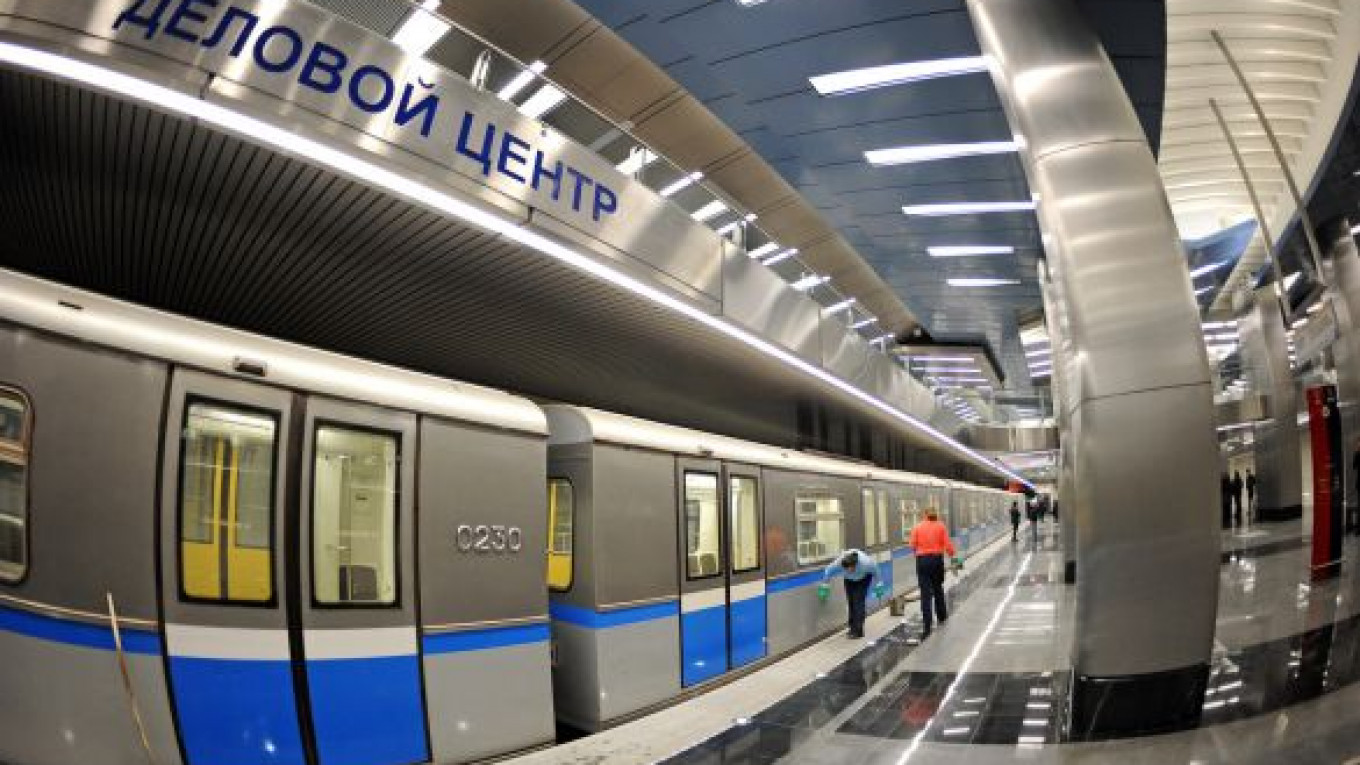The already rapid expansion of the Moscow metro may be picking up steam, if a flurry of announcements in recent days is to be believed.
A brand-new portion of the Butovskaya metro line, which will link the southernmost stations of the orange and gray Lines, may be open to the public by the end of this week, Deputy Mayor Marat Khusnullin said Friday, RIA Novosti reported.
The new line will include three stations — Ulitsa Starokachalovskaya, with a transfer to the gray line station Bulvar Dmitria Donskogo, Lesoparkovaya and Bitsevsky Park, which connects to the orange line station Novoyasenevskaya.
Khusnullin has made two other statements suggesting that the total number of stations to be built between 2013 and 2020, previously 79, may be on the rise.
Speaking at the Friday opening of the new Delovoi Center station beneath the Moscow City cluster of skyscrapers, Khusnullin announced that the new extension to the yellow line that includes Delovoi Center may be lengthened to Vnukovo airport in the southwest outside the capital.
Moscow Mayor Sergei Sobyanin has ordered the extension to be included in the city's updated general plan, Khusnullin said. The deputy mayor had said last year that a metro station in Vnukovo would be seen only after 2020.
Meanwhile, construction continues on an extension of the red line south from Yugo-Zapadnaya that will feature Moscow's first two-story metro station, the city's construction department said in a statement Monday.
By placing utilities rooms and facilities for staff on a second floor above the platforms in the Rumyantsevo station, the builders were able to "significantly decrease the length of the station complex, and thus reduce the area of the construction site and cut costs," the statement said.
The added stations will extend the red line 6.5 kilometers south, terminating at a new station named Salaryevo.
On Monday, Khusnullin said that Salaryevo could be the starting point for yet another new 4-kilometer metro line, which will connect the city to the industrial park Indigo in New Moscow.
Several thousand new jobs have already been created at Indigo, he said, and even more will soon be found in the adjacent territory.
"Given such a concentration of jobs in the area, we must provide transport" Khusnullin said.
Expansion of the metro is not only a service to residents but a profitable investment for the city, said Anatoly Fedorenko, a professor in the logistics faculty of the Higher School of Economics.
In the short-term, the city will benefit from the taxes generated by such major construction works, while in the long-term the new stations will decrease workers' commutes and the concomitant losses in labor time.
Pivotal in this regard is the new line that will encircle Moscow at a greater distance than the original Circle Line, allowing passengers to transfer without traveling all the way to the city center first.
The new stations will also hopefully decrease Moscow's infamous traffic jams by persuading drivers to abandon their beloved cars for more efficient transport, Fedorenko said.
"It is more difficult to develop vehicular traffic than to build metro stations, although the metro is more expensive," he said.
Asked if the metro's growth will tail off after 2020, Fedorenko said it was unlikely — unless a new form of urban transport arises to give the metro a run for its money.
Contact the author at d.damora@imedia.ru
A Message from The Moscow Times:
Dear readers,
We are facing unprecedented challenges. Russia's Prosecutor General's Office has designated The Moscow Times as an "undesirable" organization, criminalizing our work and putting our staff at risk of prosecution. This follows our earlier unjust labeling as a "foreign agent."
These actions are direct attempts to silence independent journalism in Russia. The authorities claim our work "discredits the decisions of the Russian leadership." We see things differently: we strive to provide accurate, unbiased reporting on Russia.
We, the journalists of The Moscow Times, refuse to be silenced. But to continue our work, we need your help.
Your support, no matter how small, makes a world of difference. If you can, please support us monthly starting from just $2. It's quick to set up, and every contribution makes a significant impact.
By supporting The Moscow Times, you're defending open, independent journalism in the face of repression. Thank you for standing with us.
Remind me later.






